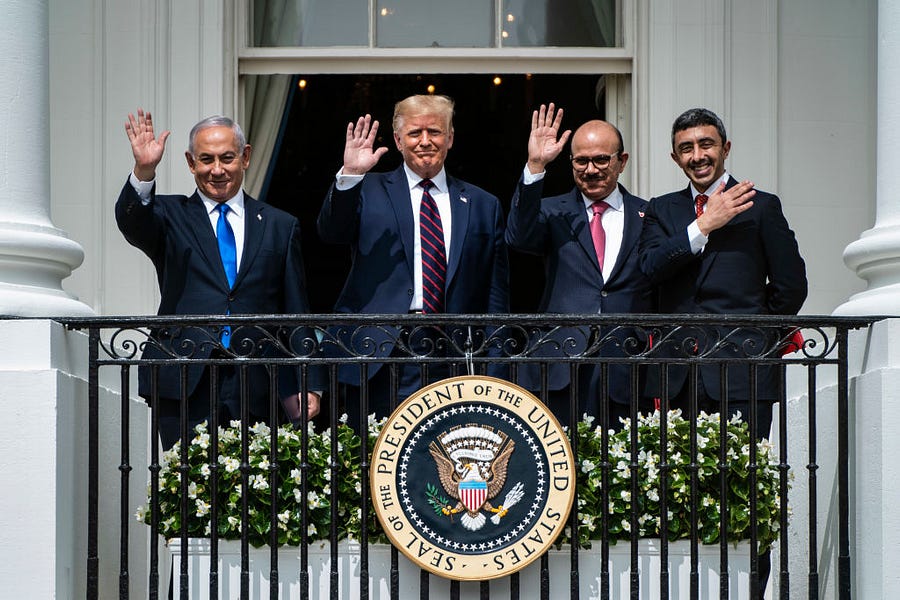Tuesday will mark one year since the foreign ministers of the United Arab Emirates and Bahrain met with Israeli Prime Minister Benjamin Netanyahu and President Donald Trump on the White House lawn to sign agreements that recognized Israel and pledged their countries to mutual cooperation. They were followed shortly thereafter by Morocco and Sudan. Colloquially known as the “Abraham Accords,” these agreements will be celebrated today in Washington at an event featuring the Israeli ambassador and representatives from every Arab country that recognizes Israel, as well as former U.S. administration officials.
These agreements represented a sea change in Arab-Israeli relations and led to massive benefits both to Israel and their new Arab friends.
The Abraham Accords were in stark contrast to another agreement, signed 53 years before, almost to the day. In September 1967, the Arab League famously signed the Khartoum Resolutions, more colloquially known as the “Three No’s,” indicating that Arab countries would never have peace with Israel, would never negotiate with Israel, and would never recognize Israel. This rejection of Israel’s legitimacy governed Arab-Israeli relations for decades.
But how did we move from Arab rejection of Israel’s very existence to this new era of mutual recognition and cooperation?
The Khartoum Resolutions came in the immediate aftermath of the Six-Day War, a multistate effort by several Arab countries to destroy Israel that ended in a catastrophic tactical defeat. By signing the “Three No’s,” the Arab League nations were signaling that while the battle may have been lost, they maintained their aim of destroying Israel and some day would finish the job. Israel, for its part, declined to commit national suicide.
Thus, the Arab League and the Israelis were diametrically opposed. Israel wanted to exist, while the Arab League wanted Israel to be destroyed. To resolve the situation, one side had to convince the other to change its mind about the desired outcome. The Abraham Accords represented not simply a new diplomatic venture, but, on the part of the signatories, a dramatic end to a war that had lingered for more than 50 years.
Put more simply: Israel “won.”
But its victory did not mean the destruction of Abu Dhabi, the sacking of Casablanca, the obliteration of Khartoum, or the razing of Manama. Indeed, it represented the precise opposite.
Since the Abraham Accords were signed in September 2020, there have been dramatic economic benefits for the UAE, Sudan has received badly needed economic aid, Bahrain has increased its international security vis-à-vis Iran, and the cultural ties that have flourished between Israel and Morocco have benefited both countries. In other words, Israel’s victory has been more beneficial to its former antagonists than to itself.
Moreover, recognizing Israel has not led to any significant backlash with local Arab populations, as some analysts feared. Morocco’s Islamist party, which rejected peace with Israel, recently suffered a crushing defeat in the most recent parliamentary elections. The citizenry of UAE and Bahrain are closely divided on the question, both being roughly 50/50, but the fact that half the population approves shows that it is no different than any other controversial issue. It is difficult to poll war-torn Sudan, but its interim government repealed Sudan’s anti-Israel boycott law earlier this year to little fanfare. To date, it has been a virtually unalloyed good.
Sadly, the “peace process,” started in 1994 by the Oslo Accords with the aim of achieving peace between Israel and the Palestinians, has not had the same success as the Abraham Accords. Why? Because the Palestinians, unlike the Abraham Accord countries, have never given up on their goal of ending Israel’s existence.
This cannot fairly be blamed on Israel’s lack of concessions. Israel has offered a two-state solution multiple times, only to be rejected by the Palestinians. And the Palestinian Liberation Organization specifically disavowed sovereignty over the West Bank or Gaza in its founding charter in 1964. Denial of Israel’s right to exist was its chief goal.
Unfortunately, this rejection of Israel’s right to exist has become the focal point of most Palestinian leaders, from the PLO to Hamas. Brutal attacks on the Jewish state, as we saw earlier this year from Gaza, resulted in little but waste of Palestinian blood and treasure in a futile effort to destroy Israel.
These efforts are fueled not only by Hamas but by non-stop propagandizing from the United Nations Relief and Works Agency (UNRWA), which continues to sell the lie that Palestinians are “refugees” in their own homes, and from by misguided actors in the international community who claim that peace will come if we just get one more Israeli concession on whatever minor issue that dominates the headlines at the time.
Meanwhile, the PLO continues to fund the families of dead or imprisoned terrorists.
Instead of all this propagandizing and blame shifting, the Abraham Accords show the true way to Palestinian advancement: to cease their war aims and concede defeat in their quest to destroy Israel. Having done that, just as with UAE, Bahrain, Sudan and Morocco, massive benefits in terms of economics, culture, diplomacy, and security await them. But only if they first end their suicidal quest to destroy Israel.
While the Abraham Accords generated little backlash in the signatory nations, the same can’t be expected in the West Bank and Gaza should a similar attempt be undertaken. But that is even more reason for Israel to stand strong. Placating destructive demands of the current Palestinian leadership, or hypersensitivity to the immediate reaction of the Palestinian street, can never persuade the Palestinians to give up their aims. Only by every provocation being met with a strong response, and every indication being given that Israel will never go away, can the Palestinians be made to know their quest to destroy Israel is futile. But by accepting the reality of Israel’s permanent existence, Palestinians can achieve their as-of-yet unrealized potential.
Ultimately, the Abraham Accords represent not just a diplomatic victory for the countries involved, but a new way of thinking about the Arab world’s relationship with Israel. They represent a repudiation of the Khartoum Resolutions, and the creation of a new paradigm. Arabs stand the most to gain by shifting from a quest to destroy Israel, to open cooperation with it. This is true of all Arabs, but it is especially true of Palestinians.
On this anniversary of the Abraham Accords, Palestinians should take note. Israel’s “victory” need not look like the destruction left in the wake of the recent conflict in Gaza, but like the skyscrapers of Dubai.






Please note that we at The Dispatch hold ourselves, our work, and our commenters to a higher standard than other places on the internet. We welcome comments that foster genuine debate or discussion—including comments critical of us or our work—but responses that include ad hominem attacks on fellow Dispatch members or are intended to stoke fear and anger may be moderated.
With your membership, you only have the ability to comment on The Morning Dispatch articles. Consider upgrading to join the conversation everywhere.